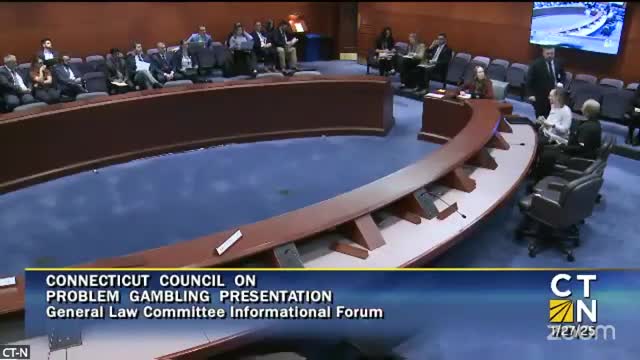Problem‑gambling calls spike after expanded online gaming; council urges prevention, college outreach and stronger treatment funding
Get AI-powered insights, summaries, and transcripts
Subscribe
Summary
The Connecticut Council on Problem Gambling told the General Law Committee that helpline calls rose about 150% since legalization of online gaming; calls increasingly come from young men and from parents seeking help for adult children. The council urged larger prevention investments and described campus‑focused education efforts.
The Connecticut Council on Problem Gambling told the General Law Committee that its helpline and prevention programs have seen a measurable shift in callers since online gaming and mobile sports wagering expanded in the state.
Diana Allgood, executive director of the council, said the council’s helpline has seen its call volume rise dramatically: “Since the legalization of online gambling, the calls to our helpline have increased by a 150%,” she said. The council reported callers increasingly include males in their 20s and parents calling on behalf of young adults.
The council described three principal responses: a statewide helpline that connects callers to treatment, a college campus gambling‑prevention initiative aimed at raising awareness among students, and partnerships with tribal operators and other stakeholders to promote responsible play and to direct people to help. Mallory Schultz, the council’s prevention manager, said the campus initiative brings outreach and training to wellness centers, athletic departments and student groups to teach how to spot risky gambling behavior and how to access resources.
The council also described treatment funding streams and the role of the so‑called chronic gamblers’ fund. Allgood and other council staff emphasized that Connecticut has established treatment providers statewide and that funding can be accessed through the fund when insurance does not cover care. The council asked lawmakers to consider additional prevention and treatment resources while continuing partnerships with tribal nations, the lottery and operators.
Why it matters: The demographics of problem‑gambling callers have shifted since online offerings became widely available, and the state’s prevention and treatment systems must scale to meet greater demand. The council urged lawmakers to consider strengthening prevention funding and improving tools to reach at‑risk populations such as college students and young adults.
Committee issues and next steps: Committee members asked the council for historical helpline data and for details on repeat callers, treatment outcomes and coordination with insurance. The council committed to share data, annual reports and program materials with legislators.
